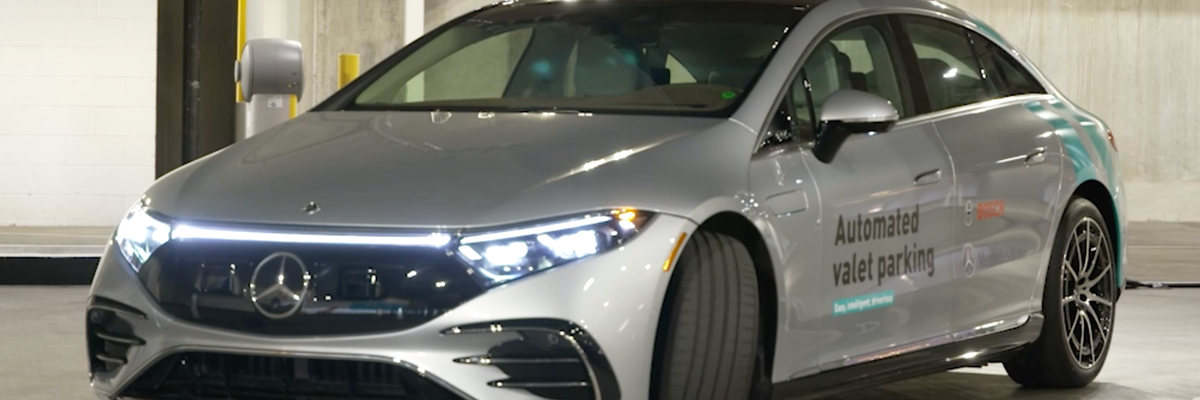

Get in the KNOW
on LA Startups & Tech
X
Courtesy of Mercedes-Benz/Bosch
Mercedes-Benz Offers a Glimpse Into a Future Where Your Car Parks Itself
Samson Amore
Samson Amore is a reporter for dot.LA. He holds a degree in journalism from Emerson College. Send tips or pitches to samsonamore@dot.la and find him on Twitter @Samsonamore.
Sign up for dot.LA's daily newsletter for the latest news on Southern California's tech, startup and venture capital scene.
Angelenos famously hate parking, but soon their cars may be able to park themselves thanks to a collaboration between Mercedes-Benz and German engineering firm Bosch.
At a demonstration in Downtown Los Angeles on Wednesday, Mercedes and Bosch gave the first U.S. test run showcasing the fruits of their collaboration: an electric Mercedes-Benz 2022 EQS 580 luxury sedan capable of navigating itself into a parking spot.
Painted in bright teal stripes, the sedan first let its driver out at a designated spot. Then, a tap of a Mercedes-Benz phone app locked the vehicle and sent it, at a gradual pace, to the first available parking space. Later, a ping from the app woke up the car—which turned itself on, pulled out of the parking spot and slowly made its way to the driver’s pickup point.
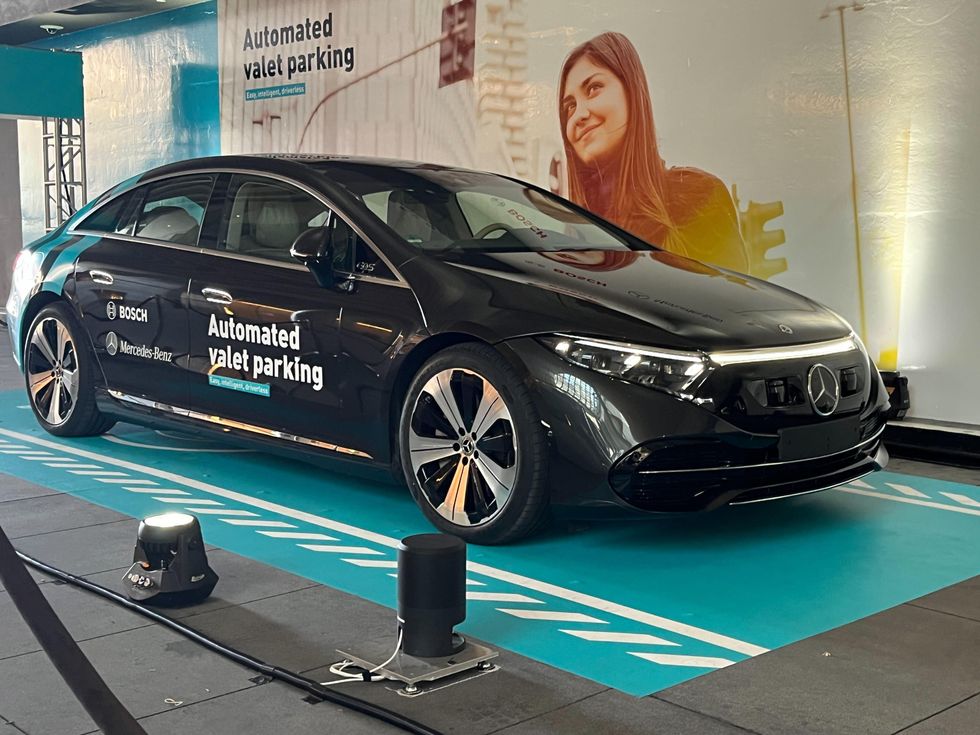
A Bosch engineer stepped in front of the car several times as it was driving to demonstrate its safety features; if sensors detect a presence or any motion in front of the car, they’ll tell it to stop a safe distance away. (For extra security, a person walked alongside the car with an emergency shut-off button.)
Kay Stepper, Bosch’s senior vice president of automated driving for North America, noted that the self-parking technology relies on sensors and cameras built into its surrounding environment, which guide the car into its space. (The sensors are installed on the ground, while the cameras are mounted above.) He added that the technology could be applied to any type of car, so long as a manufacturer makes it compatible with its vehicle.
“The unique thing is really that we are not using any of the in-vehicle sensors—it’s a purely infrastructure-based solution,” Stepper told dot.LA.
Courtesy of Mercedes-Benz/Bosch
Using the MercedesMe app, a driver has access to their vehicles’s smart options.
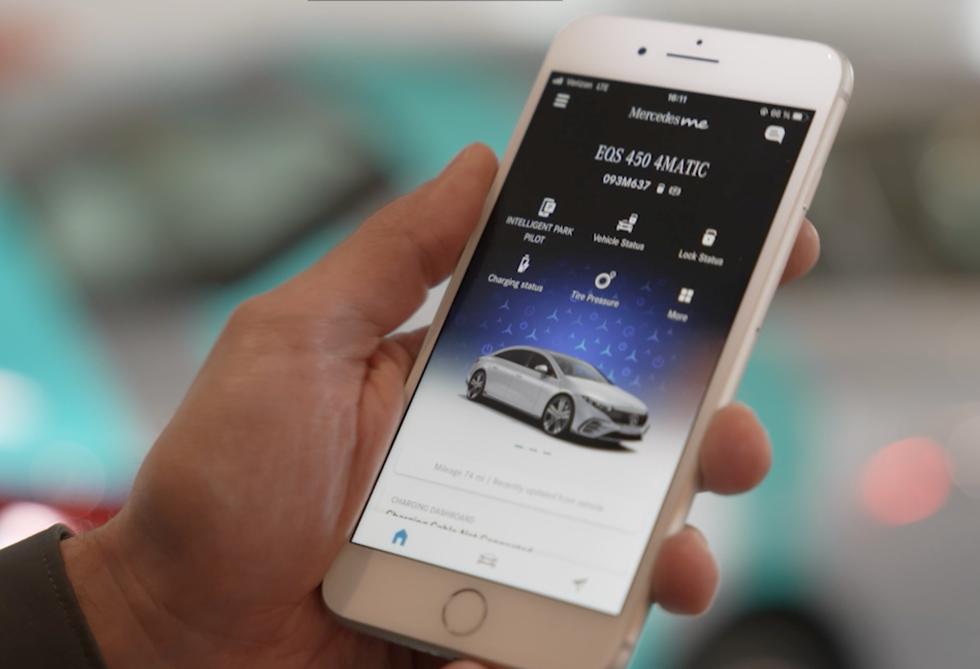
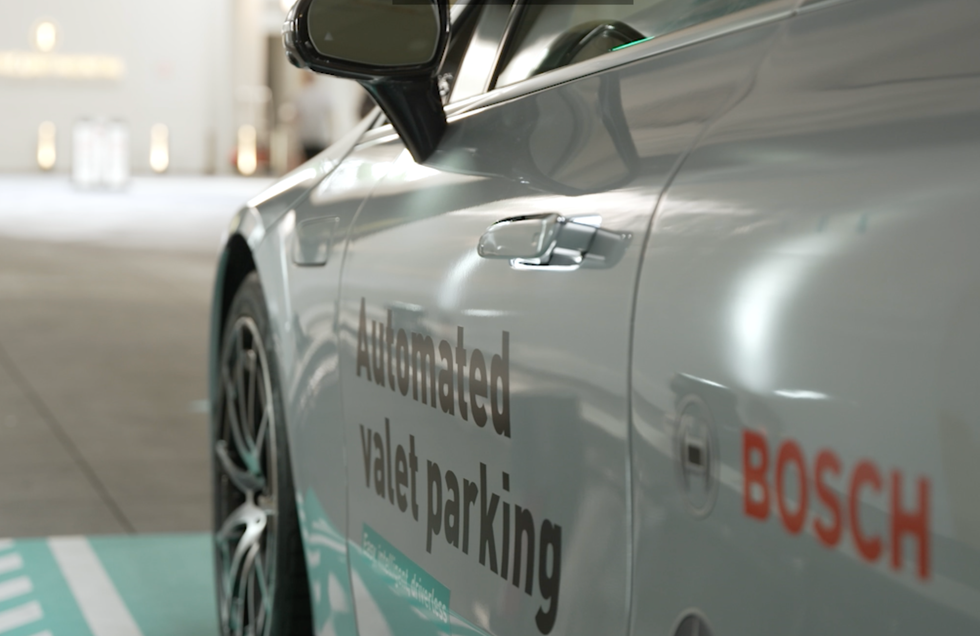
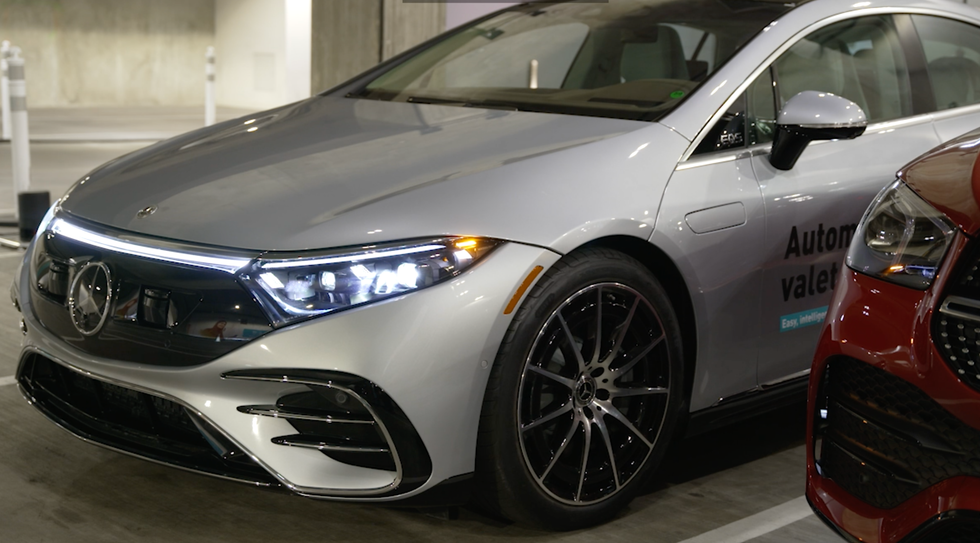
The demo marked the first time that Mercedes and Bosch have tested the technology outside of Germany. In their home country, the driverless parking capability is already installed and ready to use at Stuttgart Airport pending final regulatory approval, according to Philipp Skogstad, Mercedes’ president and CEO of North American research and development.
A handful of other auto industry names are also investing in automated valets, including the Volkswagen Group-owned CARIAD, which demonstrated its technology at an industry summit in Munich last. Yet another competitor is Maryland-based STEER. Other companies focused on autonomous technology from more of a road-driving perspective are Google’s Waymo and, of course, Tesla.
Skogstad acknowledged the increasingly crowded playing field. “Automated driving is such a complex task requiring so many pieces to come together that nobody can do that alone,” he said. “No matter how much money you have, you need partners.”
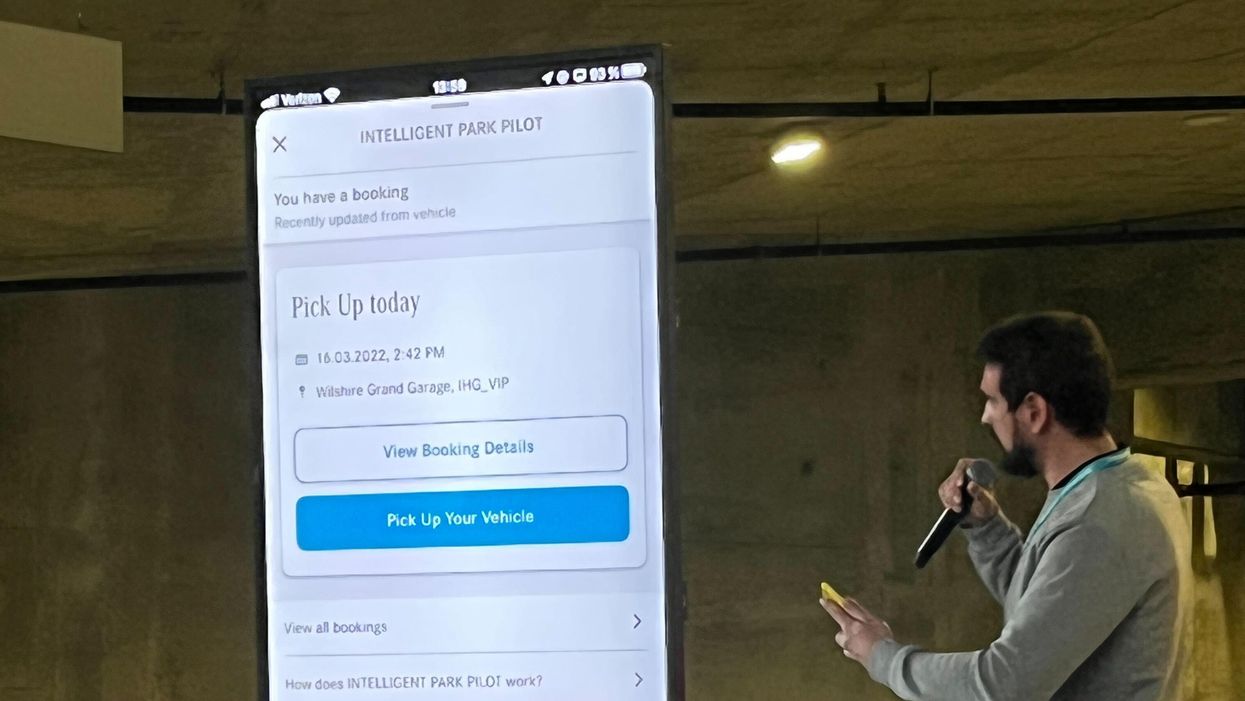
Stepper noted that Bosch is “intensely” focused on finding collaborators in the “smart infrastructure” space who can help it implement a driverless parking network. The next step, he added, is to convince local parking operators to invest in the technology. Without human error (consider that driver in your apartment building’s garage who’s always double-parked), he estimated that a fully-automated parking lot could fit up to 20% more cars.
And what about the valet workers—such as those on hand at the demo, who were kind enough to park cars for the event’s attendees the old-fashioned way? A Bosch spokesperson noted that they wouldn’t exactly be put out of business, as self-parking garages would still need humans to operate and maintain their technology and act as a safeguard.
From Your Site Articles
- Autonomous Vehicle Companies Doubled Their Testing Miles - dot.LA ›
- Motional Expands Its Autonomous Vehicle Operations in LA - dot.LA ›
Related Articles Around the Web
Samson Amore
Samson Amore is a reporter for dot.LA. He holds a degree in journalism from Emerson College. Send tips or pitches to samsonamore@dot.la and find him on Twitter @Samsonamore.
https://twitter.com/samsonamore
samsonamore@dot.la
Perelel, the LA startup quietly fixing women’s health
10:21 AM | November 21, 2025
🔦 Spotlight
Happy Friday LA!
While the market obsesses over the latest AI tool, one of the most interesting checks this week went to something more basic and much harder to fake: women’s health.
Perelel, a doctor founded, research backed supplement company for women, just raised 27 million dollars in growth funding led by Prelude Growth Partners, with existing investors including Unilever Ventures, Willow Growth Partners and Selva Ventures coming back in. Co founded by CEO Victoria Thain Gioia, who comes from a background in finance and operating roles at consumer brands, former media executive Alex Taylor, and OB GYN Dr. Banafsheh Bayati, the company has spent the last five years quietly building a profitable business that has doubled revenue year over year and has some of the strongest subscriber retention in its category.

The wellness aisle is crowded with influencer brands and one size fits all multivitamins. Perelel is trying to be the adult in the room. The team designs products with OB GYN input, clinical backing and formulas tailored to specific chapters of a woman’s hormonal life, from fertility and pregnancy to postpartum, perimenopause and beyond. Most of its line now carries a Clean Label Project Purity Award, which is a polite way of saying they’re willing to have someone else check what’s actually in the bottle.
This round is less about a splashy launch and more about upgrading the cap table and the support system. The founders used the raise to buy out early angel investors and bring in Prelude Growth, a women-founded firm with a track record in modern consumer health and beauty. The new capital is aimed at deeper research, more life stage specific products and broader distribution rather than chasing the trend of the month.
In a category that has historically treated women’s health as an afterthought, a clinically serious, women led company raising growth capital to build a full lifecycle platform feels like a meaningful data point. Scroll down for this week’s LA venture deals, funds and acquisitions.
🤝 Venture Deals
LA Venture Funds
- Anthos Capital participated in Kalshi’s new $1B funding round, which values the CFTC-regulated prediction market platform at $11B and was led by returning investors Sequoia Capital and CapitalG alongside Andreessen Horowitz, Paradigm and Neo. The capital will help Kalshi scale its event-contracts exchange, expand beyond politics into areas like macro data and business events, and compete more aggressively with rival prediction platforms as institutional and retail interest in trading real-world outcomes grows. - learn more
- UP Partners participated in Point One Navigation’s $35M Series C round, backing the San Francisco-based precise location startup alongside lead investor Khosla Ventures and fellow existing investors IA Ventures and Alumni Ventures. The company provides centimeter-level GNSS correction and positioning services for “physical AI” applications like autonomous vehicles, robots and smart equipment, and plans to use the new funding to expand its Polaris RTK network, enhance its location platform and grow its team across R&D, OEM integrations and international operations. - learn more
- Embark Ventures participated in QSimulate’s latest seed financing, which brings the Boston-based quantum simulation startup’s total funding to just over $11M. The company also launched QUELO v2.3, a new generation of its quantum-powered drug discovery platform that uses real-time quantum mechanics to model drug–protein interactions far faster than traditional methods, and it plans to use the capital to scale operations and support growing collaborations with major pharma and tech partners. - learn more
- Cultivate Next, Chipotle Mexican Grill’s venture fund, participated in Athian’s $4M Series A round, backing the Indianapolis-based startup alongside Ajinomoto Group Ventures, Mondelēz International’s Sustainable Futures platform and a roster of existing strategic investors from across the livestock and food value chain. Athian, founded in 2022, operates a platform that aggregates, verifies and monetizes on-farm greenhouse gas reductions so food brands can hit their Scope 3 climate targets, and it says it has already facilitated $18M in payments to farmers as it expands its protocols, species coverage and international footprint. - learn more
- Fika Ventures joined Coverbase’s $16M Series A as a returning investor from the seed round, backing the company alongside lead investor Canapi Ventures and others. The San Francisco based startup uses AI agents to automate vendor procurement and third-party risk review for regulated enterprises, serving customers like Coinbase, Okta and Nationwide, and the new funding will help it expand into contract management, continuous security monitoring and a larger go-to-market team. - learn more
- BroadLight Capital and HeartBeat Ventures are among the investors backing Function Health’s $298M Series B round, which values the company at $2.5B and supports its push to become a new standard in proactive, data-driven healthcare. The Austin-based startup offers a membership platform that combines extensive lab testing with AI to help people track and manage their health, and it’s using the new capital to launch its Medical Intelligence Lab, an initiative aimed at turning that data into personalized medical insights at scale. - learn more
- Hallwood Media joined Menlo Ventures and other investors in Suno’s $250M Series C round, which values the AI music startup at $2.45B. The Cambridge based company lets users generate fully produced songs from text prompts and is using the new funding to expand tools like its Suno Studio workstation and next-generation music models, even as it navigates high-profile copyright lawsuits from major record labels. - learn more
- Upfront Ventures joined the $7M seed round for alphaXiv, investing alongside co-leads Menlo Ventures and Haystack, plus Shakti VC, Conviction Embed and several high-profile angels. The San Francisco based company runs a platform that helps AI practitioners and researchers discover, compare and apply cutting-edge AI papers, benchmarks and implementations, and it plans to use the new funding to further bridge the gap between fast-moving AI research and real-world production deployments. - learn more
- Regeneration.vc joined TULU’s $37M Series A extension as an existing investor, backing the company alongside GreenSoil PropTech Ventures, Bosch Ventures, New Era Capital Partners and others. TULU runs an AI powered product access platform that installs shared, IoT enabled units inside residential and commercial buildings so residents can rent or buy items like appliances, e scooters and household essentials on demand, and the new funding will help the company scale its “TULU Brain” data engine and expand its footprint beyond the 500,000 residents it already serves across North America and Europe. - learn more
- WndrCo has joined Method Security’s $26M combined seed and Series A round, alongside Andreessen Horowitz, General Catalyst, Blackstone Innovations and others. The startup, which operates out of New York and Washington DC, is building an autonomous cyber platform that combines offensive and defensive tools into a digital twin of an organization, helping US government agencies, the Department of Defense and large enterprises continuously test and strengthen their defenses against AI driven threats, a thesis that fits neatly with WndrCo’s focus on infrastructure and security. - learn more
- Coral Tree Partners has led a new Series B round for KERV.ai, backing the Austin based company as it scales its AI-powered contextual commerce and video advertising platform. The funding will be used to invest in R&D, technology, talent and infrastructure so KERV.ai can further expand its interactive, shoppable video solutions and first-party data targeting tools for brands, agencies and publishers, while pushing into new markets and strategic partnerships. - learn more
- CIM Group and Group 11 are backing Venn’s new $52M Series B, with CIM co-leading the round alongside NOA and Group 11 re-upping as an existing investor. The New York and Tel Aviv based company builds an operating system for multifamily housing that unifies data and workflows so landlords and operators can run buildings more efficiently and treat them like modern consumer brands. Over the last 18 months, Venn says it has expanded across dozens of U.S. states, partnered with hundreds of owners and operators, and grown annual recurring revenue ninefold, setting up this round to fuel further product development and market expansion. - learn more
- Walkabout Ventures led Barker’s $3.5M seed round, backing the New York based fintech as it builds warrantied AI valuations for illiquid, hard-to-price assets in asset-backed lending. Barker’s platform uses an “agentic valuation system” and insurance from Munich Re to warranty its AI-generated prices on assets like aircraft, equipment, art and GPUs, so lenders are protected if the collateral ultimately sells for less than the model predicted, and the new funding will help the company expand into more asset classes and deepen partnerships across banks and private lenders. - learn more
- Freeflow Ventures joined Erg Bio’s $6.5M seed round, investing alongside lead Azolla Ventures, Chevron Technology Ventures, Plug and Play and other strategic backers. Erg Bio is developing its Aspire platform, a flexible, low-temperature pretreatment and catalytic process that turns agricultural and forestry waste into intermediates for synthetic aviation fuel and critical biobased chemicals, and the new capital will help scale the technology, expand engineering and bioprocessing teams, and move toward pilot-scale demos. - learn more
- Pinegrove Venture Partners participated in Ramp’s new $300M financing round, joining Lightspeed Venture Partners and a long list of existing and new backers as the company’s valuation hit $32B. The New York based spend management and corporate card platform now generates over $1B in annualized revenue, serves more than 50,000 business customers and processes upwards of $100B in annual purchase volume, and this fresh capital will support continued product expansion and enterprise growth. - learn more
- Alexandria Venture Investments and B Capital joined Solve Therapeutics’ new $120M financing round, backing the San Diego based biotech alongside lead investor Yosemite and a broader syndicate that includes Merck & Co. and other life sciences funds. The company is developing next-generation antibody-drug conjugates for solid tumors using its proprietary CloakLink linker platform, and it plans to use the capital to advance its lead programs SLV-154 and SLV-324 through Phase 1b trials and further build out its ADC and diagnostics pipeline. - learn more
- Factorial Funds joined Sakana AI’s $135M Series B round, backing the Tokyo-based startup as it doubles down on building efficient, Japan-focused AI models rather than chasing ever-larger, compute-heavy systems. The financing, which values Sakana at about $2.65B, will help expand its “sustainable AI” research and grow its team as it rolls out sovereign, culturally tailored AI solutions for Japanese enterprises and sectors like finance, manufacturing, and government. - learn more
- Smash Capital joined AVP and other investors in backing Flatpay’s latest round, which raised roughly €145–170M and crowned the Danish SMB payments startup as Europe’s newest fintech unicorn at around a €1.5B valuation. The company, which offers flat-rate card terminals and POS systems for small merchants, has scaled to roughly 60,000 customers and over €100M in ARR, and will use the fresh capital to accelerate European expansion, deepen its product stack and significantly grow headcount. - learn more
- Fusion joined No Barrier’s oversubscribed $2.7M seed round, investing alongside lead backers A-Squared Ventures, Esplanade Ventures and Rock Health Capital to scale the company’s AI-first approach to medical interpretation. The San Francisco based startup integrates real-time, HIPAA-compliant language interpretation into hospital systems and EHRs across 40+ languages, and will use the new funding to expand deployment across U.S. care settings and further reduce health disparities for patients with limited English proficiency. - learn more
- Matter Venture Partners joined Vertex Ventures and other global investors in backing Ruochuang Technology’s Pre A round, which totals tens of millions of dollars to fuel the company’s next stage of growth. The startup develops low speed robotics and related IoT hardware, spanning technology R and D, device manufacturing and sales, and this new capital will help it deepen intelligent hardware research and expand its market footprint as demand for smart manufacturing and IoT applications accelerates. - learn more
- B Capital joined Shipday’s $7M Series A as a participating investor, re-upping after leading the company’s 2023 seed round and backing the Menlo Park–based startup alongside co-leads ECP Growth and Ibex Investors. Shipday provides an AI-powered last-mile delivery and logistics platform for SMBs like restaurants and local retailers, and it plans to use the new funding to build out features such as its AgentFlow automation engine, deepen integrations, and expand its global reach beyond the 5,000 businesses it already serves in 100+ countries. - learn more
- MANTIS Venture Capital participated in Bedrock Data’s $25M Series A round, joining lead investor Greylock Partners alongside Mangusta Capital, Pier 88 Investment Partners and others to back the Menlo Park based data security startup. Bedrock Data provides an AI-native, data-centric security and governance platform powered by its “Metadata Lake,” and it plans to use the new funding to accelerate product development and expand go-to-market efforts as enterprises look to secure data across cloud, SaaS and AI systems at multi-petabyte scale. - learn more
- TenOneTen Ventures and Wedbush Ventures joined Meadow AI’s $6M in total funding, including a $4.5M seed round they backed alongside co-lead Leadout Ventures and other investors. The Seattle-based startup is emerging from stealth with a multimodal AI platform that helps restaurants and retailers monitor real-time operations and automate “secret shopper” audits across 10–300-location chains, already driving more than $2.5M in contracted ARR as it targets further growth in physical retail. - learn more
LA Exits
- Neotech, a long-time provider of high-reliability electronic manufacturing services, has been acquired by private equity firm Arkview Capital in a deal that marks a major new chapter for the company. With Arkview as its new owner, Neotech plans to strengthen its balance sheet, invest in next-generation manufacturing, and expand its capabilities across core markets like defense, aerospace, medical and industrial electronics, while continuing to emphasize quality, reliability and customer service. - learn more
Read moreShow less
LA Is Betting on Nukes, Netflix and Next-Gen Attention
11:30 AM | December 19, 2025
🔦 Spotlight
Hey Los Angeles.
If you were looking for a quiet week, this was not it. LA is backing a portable nuclear reactor, Netflix just took a big step closer to owning Warner Bros. Discovery’s future, and Snapchat is basically handing the city a mirror and saying, “Here is what you did with your attention all year.”
Let’s dive in.
Radiant’s microreactors and LA’s new nuclear moment
Radiant Nuclear raised more than $300M in a Series D round to build Kaleidos, a one megawatt portable nuclear microreactor that is designed to roll off a factory line, ship in a standard container and replace diesel generators at remote sites, military bases and disaster zones. The new capital will fund a full scale test at Idaho National Lab and the build out of Radiant’s R 50 factory in Oak Ridge, Tennessee, which aims to produce up to 50 reactors a year starting later this decade.
For LA’s climate and infrastructure ecosystem, this is a big tell. The city that got rich on pipelines of content is now funding pipelines of electrons, betting that small, modular nuclear can be part of the grid story that powers everything from data centers to defense. It is a very different flavor of LA tech, but the pattern is familiar: take a frontier technology, wrap it in product thinking and try to make it feel as boring and reliable as a utility bill.
Netflix and Warner Bros. Discovery: one step closer
On the media front, Netflix just received an official recommendation from Warner Bros. Discovery’s board to proceed with the planned acquisition of WBD’s studios and streaming business. The board reaffirmed that the Netflix deal, which would fold Warner Bros. film and TV, HBO and HBO Max into Netflix, is in the best interest of shareholders, even as competing ideas swirl around what to do with the company.
Practically, this does not mean the deal is done. It means the process has moved from “big idea in a press release” into the slower, more serious phase of shareholder approvals and regulatory review. For Los Angeles, every incremental step like this reinforces the likely end state: a world where a handful of global platforms control not just distribution but also the studios and libraries that defined Hollywood’s last century.
Snapchat’s 2025 Recap and the attention economy in our backyard
Then there is Snapchat, which used its 2025 Recap to show off what its mostly Gen Z and Gen Alpha users actually did on the app this year. The company is leaning into personalized “year in review” stories that highlight top chats, memories, maps moments and creator content, while quietly reminding brands and investors that Snap still owns a very specific slice of youth attention that is hard to find anywhere else.
For LA, Snapchat’s recap is more than a cute end of year product. It is a reminder that some of the most important social infrastructure for the next generation is being built and iterated a short drive from Santa Monica Boulevard. While the grown ups argue about nuclear reactors and studio mergers, Snap is training the next wave of consumers how to communicate, create and remember their lives on a platform that barely existed fifteen years ago.
Taken together, this week says a lot about what “LA tech” means in 2025. On one end, you have Radiant trying to change how we power the physical world. On the other, Netflix and Snapchat are fighting over how we package and monetize the stories that live in our heads. Somewhere in the middle are the founders, investors and operators here who see all of this as raw material.Now keep scrolling for this week’s LA venture deals, fund announcements and acquisitions.
🤝 Venture Deals
LA Companies
- Fixated secured a $50M strategic investment from Eldridge Industries to fuel what it calls the “next era of creator-led empires.” The company says the capital will help it expand its capabilities and partnerships that support creators in building and scaling their own brands and businesses beyond traditional sponsorship deals. - learn more
- Vital Lyfe raised $24M in financing, including more than $18M in seed funding, in a round led by Interlagos and General Catalyst with participation from Generational Partners, Cantos, Space.VC and Also Capital. The Hawthorne based startup, founded by former SpaceX engineers, will use the capital to ramp manufacturing of its portable, autonomous “water making” systems, expand early deployments with partners like maritime operators and NGOs, and prepare for its first consumer ready products in 2026. - learn more
- Molly Sims’ YSE Beauty closed a $15M Series A growth equity round led by Silas Capital, with participation from L Catterton and existing backers Willow Growth Partners and Halogen Ventures. The clinically tested skincare brand, which targets women 35+ and recently rolled out nationally at Sephora, will use the funding to fuel product development, expand across Sephora doors in the U.S., and grow its direct-to-consumer e-commerce business. - learn more
- Ember LifeSciences raised a $16.5M Series A led by Sea Court Capital, with participation from Cardinal Health, Carrier Ventures and other strategic investors including former U.S. Secretary of State Mike Pompeo. The Los Angeles based cold chain tech company will use the funding to launch its next generation Ember Cube 2 shipping system and expand globally, helping pharma and healthcare customers cut temperature related losses and waste in medicine distribution. - learn more
- Strada, a Los Angeles–based media collaboration startup, received a strategic investment from Other World Computing (OWC) to accelerate its product roadmap. The company’s peer-to-peer platform lets video pros access, share and review large files directly from local drives anywhere in the world, without uploading to the cloud. The partnership will also include co-marketing efforts, joint NAB 2026 presence, and bundled offerings that pair Strada’s software with OWC’s storage and workflow hardware. - learn more
LA Venture Funds
- Calibrate Ventures participated in Manifold’s Series B round, backing the company as it scales its AI technology platform. Manifold plans to use the new capital to accelerate product development, deepen its capabilities for enterprise customers, and grow its team to support broader commercial rollout. - learn more
- SmartGateVC participated in NeuraWorx’s oversubscribed seed round, which was led by Nexus NeuroTech to back the company’s neurotechnology based therapies for central nervous system (CNS) disorders. NeuraWorx plans to use the capital to advance its R&D and early clinical work, build out its technology and product pipeline, and expand its team as it moves toward bringing new CNS treatments to market. - learn more
- Kinship Ventures participated in Lovable’s $330M Series B, which values the Stockholm based “vibe coding” platform at $6.6B in a round co-led by CapitalG and Menlo Ventures’ Anthology fund. The company lets non developers build full stack software from natural language prompts, and says it will use the new capital to scale its AI native platform globally, deepen enterprise features and integrations, and support a fast growing base of business users building production apps on Lovable. - learn more
- B Capital participated in MoEngage’s $180M Series F follow-on, which brings the customer engagement platform’s total Series F raise to $280M. The round was led by ChrysCapital and Dragon Funds, with Schroders Capital and TR Capital also joining, and will be used to accelerate MoEngage’s Merlin AI product roadmap, expand go-to-market teams across North America and EMEA, and pursue strategic acquisitions while also funding an employee and early-investor liquidity program. - learn more
- O'Neil Strategic Capital led HEN Technologies’ $22M financing, which combines a $20M oversubscribed Series A with $2M in venture debt, to build what the company calls the industry’s first operating system for fire defense. The Hayward based startup will use the capital to scale its IoT enabled hardware and Fluid IQ predictive AI platform, capture a comprehensive operational fire dataset, and expand global deployments with distributors and agencies as it aims to make fire suppression faster, more efficient and data driven. - learn more
- Core Innovation Capital participated in Transparency Analytics’ second funding round, backing the company alongside lead investor Deciens Capital, Allianz Life Ventures, Mouro Capital, FJ Labs and SUM Ventures. Transparency Analytics, which provides quantitative, tech enabled credit ratings and benchmarking for private credit, will use the funding to scale its platform, refine go to market strategy and build out products like its private credit index as the asset class grows. - learn more
- Upfront Ventures participated in Nanit’s $50M growth round, which was led by Springcoast Partners with support from JVP. The company will use the funding to expand its AI powered Parenting Intelligence System and related tools that give parents real time, personalized insight into a baby’s sleep, health and development between pediatric visits. - learn more
- Integrity Growth Partners fully funded Fluency’s $40M Series A, coming in as the company’s first major institutional investor. Fluency, a “digital advertising operating system,” centralizes and automates paid media across Google, Meta, TikTok, programmatic and more, already powering nearly $3B in annual ad spend and over 250,000 monthly campaigns. The company plans to use the capital to enhance its automation and agentic AI capabilities, expand integrations with publishers and tech partners, and grow its team. - learn more
- JAM Fund joined Last Energy’s oversubscribed $100M+ Series C, backing the advanced nuclear startup as it pushes to commercialize its factory built microreactors. The round was led by Astera Institute with investors including Gigafund, The Haskell Company, AE Ventures, Ultranative, Galaxy Interactive and Woori Technology. Last Energy plans to use the capital to complete its PWR-5 pilot reactor under the U.S. DOE’s Reactor Pilot Program, ramp manufacturing in Texas, and advance its larger PWR-20 units toward commercial deployment in the U.S. and U.K. - learn more
LA Exits
- NextWave is being acquired by Pattern, bringing the TikTok-focused commerce agency under Pattern’s umbrella to strengthen its TikTok Shop and creator-led commerce capabilities. The deal folds NextWave’s expertise in TikTok Shop strategy, operations and creator partnerships into Pattern’s broader ecommerce platform, giving brands a single partner to manage marketplace, DTC and social shopping channels. - learn more
- Ubiquitous is being acquired by Humanz as part of Humanz’s broader push to build a next-gen, data driven creator economy platform alongside its recently announced $15M funding round. The deal folds Ubiquitous’ creator marketing and TikTok/native social expertise into Humanz’s influencer analytics and campaign tooling, giving brands a more end-to-end partner for strategy, creator management and performance measurement across major social channels. - learn more
- Silver Tribe Media is being acquired by TPG-backed Initial Group, which is folding the company into its broader sports and entertainment platform. The deal brings Silver Tribe’s storytelling, production and athlete brand work under Initial Group’s umbrella, giving it more capital and distribution while expanding Initial’s in-house content capabilities around teams, athletes and sponsors. - learn more
- Duffl, the YC-backed campus delivery startup, is being acquired by Rev Delivery, bringing its “10M campus delivery pioneer” operation under Rev’s umbrella. The acquisition folds Duffl’s college-focused, ultra-fast delivery network and playbook into Rev’s hyper-growth delivery operators, with the goal of scaling on-demand service across more campuses and strengthening Rev’s position in student-centered last-mile logistics. - learn more
Read moreShow less
RELATEDTRENDING
LA TECH JOBS


